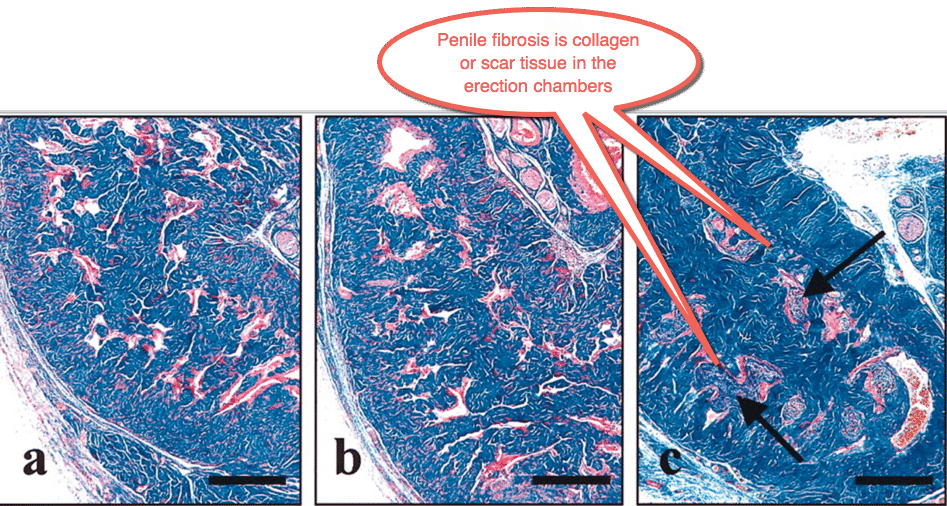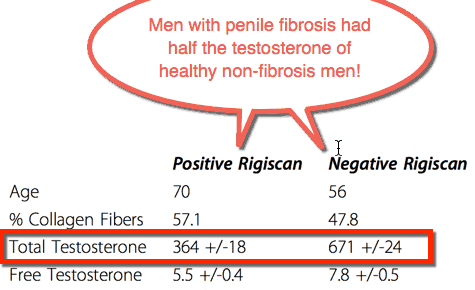
A lot of men suffer from erectile dysfunction as they age.
I mentioned earlier this week that we’d discuss one of the reasons a bit more.
This newsletter is focusing on penile fibrosis.
Penile fibrosis is caused by a plaque buildup in the blood vessels of the penis.
Without proper blood flow, you can’t get or keep an erection.
But what leads to this fibrosis?
And what can you do to fix it?
This study looks at what role testosterone plays in developing penile fibrosis.
 They evaluated 47 aging men.
They evaluated 47 aging men.
The average age of these men was around 66.
I know, that’s not really old, LOL.
They evaluated these men using a special scan that can determine the degree of penile fibrosis.
And they found:
a highly significant difference was found between age, degree of cavernosal fibrosis, and total and free testosterone levels.
All of these men had some degree of penile fibrosis.
Then they divided the men up into two groups.
They grouped the men with low amounts of fibrosis together.
And then they grouped the men with higher amounts of fibrosis together.
Note this, though — even the low fibrosis group had fibrosis of around 50%.
 In other words, men with ED who are aging often suffer a high amount of penile fibrosis.
In other words, men with ED who are aging often suffer a high amount of penile fibrosis.
And men with fibrosis had VERY low testosterone:
 So how does penile fibrosis develop?
So how does penile fibrosis develop?
The latest theories about penile fibrosis involve a particular cytokine protein called TGF-beta (TGFB).
TGFB seems to lead to the development of collagen, or scar-like tissue, in the caverns of the penis.
And low testosterone promotes the deposits of collagen in the penis erection chambers.
So all of the metabolic problems that cause low testosterone lead to these deposits.
In some cases, this will result in what’s known as Peyronie’s disease.
Peyronie’s disease occurs when this scar tissue causes abnormal curvature and atrophy in the penis.
But this study shows us that many (if not most) aging men have some degree of collagen buildup, or penile fibrosis, already.
Even if their penis is not bent.
Other studies show us the same thing.
Penile fibrosis results in lower sensation, lower pleasure, and difficulty getting and keeping erections.
It is associated with erectile dysfunction in older men.
The correlation among androgens decrease, cavernosal fibrosis and ED seems evident.
So what can fix penile fibrosis?
It’s been known for some time that men who have had a radical prostatectomy are much more likely to develop penile fibrosis.
Because penile fibrosis is a known side effect, treatments have existed for some time.
Testosterone replacement therapy and PDE5i [drugs such as Viagra] could be effective to contrast the cavernosal fibrosis linked to the aging and to the testosterone decrease.
The same effect on the corpora cavernosa could be obtained with the assumption of natural compounds containing Protodioscin and Phlorotannins with antioxidant and anti-fibrotic action.
There are probably other effective ways of combating penile fibrosis or even reversing it.
What is clear here is cause and effect.
Low testosterone plays a significant role in causing penile fibrosis.
What causes low testosterone?
I have found that men with low testosterone have many metabolic problems.
When you have a health disorder of any sort, the body stops being concerned with maintaining testosterone.
The body does not pour resources into reproduction when it is fighting other, more important metabolic problems.
By fixing these metabolic problems, a man’s testosterone rate can go up.
Sometimes their testosterone becomes two or even three times higher than before.
And it is quite possible that there are natural remedies that can both raise testosterone and combat penile fibrosis.
Citations
Testosterone deficiency causes penile fibrosis and organic erectile dysfunction in aging men. Evaluating association among Age, TDS and ED
http://www.ncbi.nlm.nih.gov/pmc/articles/PMC3499353/pdf/1471-2482-12-S1-S24.pdf
Establishment of Penile Fibrosis Model in a Rat Using Mouse NIH 3T3 Fibroblasts Expressing Transforming Growth Factor β1
http://www.biolreprod.org/content/72/4/916/F5.expansion
See this for more on Testosterone deficiency, and see more on Diet and Exercise, and for more information see effects of Testosterone.
